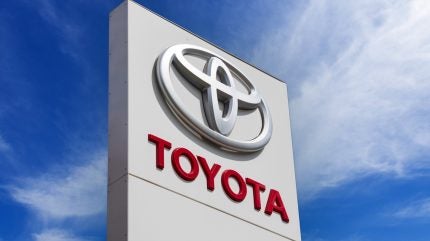
Toyota Motor will reportedly begin producing hybrid vehicles in Vietnam as early as 2027 at its plant in Phu Tho province, near Hanoi.
The Japanese automaker plans to invest about $360m to expand local capacity, reported Nikkei Asia. It will add three press machines for shaping steel sheets, bringing the total to four.

Discover B2B Marketing That Performs
Combine business intelligence and editorial excellence to reach engaged professionals across 36 leading media platforms.
The investment will also be used to automate painting and switch from oil‑based paints to water‑based products.
The upgrades are due to be completed in 2027 or later, and will allow annual capacity to be increased to around 100,000 vehicles from the current 47,000.
Vietnam sold 9,785 hybrid vehicles from January to September 2025, up roughly 70% year‑on‑year, though hybrids still represent under 3% of new‑vehicle sales, according to a report by the Vietnam Automobile Manufacturers’ Association (VAMA) mentioned by Nikkei Asia.
Toyota holds a majority share of the country’s hybrid market.
Vietnam will be Toyota’s fourth Asian country producing hybrids outside Japan, after Thailand, Indonesia and Malaysia.
Keita Nakano, president of Toyota Motor Vietnam, said new‑vehicle sales in Vietnam could reach one million a year by 2030.
Total new‑vehicle sales in 2024 were about 500,000, using VAMA figures plus VinFast and Hyundai data.
VinFast led sales in the first nine months of 2025 with 103,884 units.
Government incentives have supported VinFast’s sales: while a special consumption tax of at least 35% applies to passenger cars including hybrids, electric vehicles (EVs) face a rate of just 1–3%, keeping the price of VinFast’s entry‑level VF3 at about $13,000.
The government is expected to cut the tax on hybrids by 30 percentage points versus gasoline vehicles, which Toyota estimates would lower hybrid prices by roughly 10%. However, strict eligibility conditions will apply.
Toyota plans to pursue multiple propulsion options in Vietnam, including gasoline, hybrid, fuel‑cell and battery electric vehicles, and views hybrids as a balance between price and environmental impact in Southeast Asia, a region still largely reliant on fossil‑fuel electricity.
Meanwhile, earlier this month, Toyota entered an agreement with Sumitomo Metal Mining Company, aiming to step up collaboration in the development and mass production of cathode materials for all-solid-state batteries (ASSBs) for EVs
Toyota aims to launch a new battery electric vehicle (BEV) model powered by ASSBs in the 2027-2028 fiscal year.




